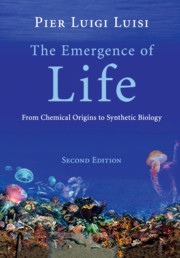Book contents
- Frontmatter
- Contents
- Acknowledgments
- Introduction
- Part I Approaches to the origin of life
- Part II What is life? The bio-logics of cellular life
- Part III Order and organization in biological systems
- 8 Self-organization
- 9 The notion of emergence
- 10 Self-replication and self-reproduction
- Part IV The world of vesicles
- Part V Towards the synthetic biology of minimal cells
- As a way of conclusion
- Appendix The open questions about the origin of life
- References
- Names index
- Subject index
9 - The notion of emergence
from Part III - Order and organization in biological systems
Published online by Cambridge University Press: 05 September 2016
- Frontmatter
- Contents
- Acknowledgments
- Introduction
- Part I Approaches to the origin of life
- Part II What is life? The bio-logics of cellular life
- Part III Order and organization in biological systems
- 8 Self-organization
- 9 The notion of emergence
- 10 Self-replication and self-reproduction
- Part IV The world of vesicles
- Part V Towards the synthetic biology of minimal cells
- As a way of conclusion
- Appendix The open questions about the origin of life
- References
- Names index
- Subject index
Summary
Introduction
The term emergence describes the onset of novel properties that arise when a higher level of complexity is formed from components of lower complexity, where “novel” means that these properties are not present at the lower level of the components. This is often summarized in the popular assertion that “the whole is more than the sum of the parts,” and/or with the vague term holism.
For a long time, emergence has been an active field of inquiry in the philosophy of science. As noted by McLaughlin (1992), the work of “British emergentism” can be dated back to Mill (1872) and Bain (1870) and flourished in the 1920s with the work of Alexander (1920), Morgan (1923), and Broad (1925); and the inquiry continues up to the present (see Wimsatt, 1972, 1976a, 1976b; Kim, 1984; Klee, 1984; Sperry, 1986; O'Connor, 1994; Bedau, 1997; Farre and Oksala, 1998; Holland, 1998; Primas, 1998; Schröder, 1998; Barabási and Réka, 1999; Juarrero and Rubino, 2010; Addiscott, 2011).
The possible relevance of chemistry in the notion of emergence was realized as early as the mid-nineteenth century (Mill, 1872); and in 1923 (as quoted by McLaughlin, 1992), Broad stated that:
… the situation with which we are faced in chemistry […] seems to offer the most plausible example of emergent behavior.
In our times, in addition to chemistry and biology, emergence is being considered in quite a variety of research fields, such as cybernetics, artificial intelligence, non-linear dynamics, information theory, social systems, music (the harmony arising from a musical phrase – something obviously not present in the single notes). In the preface to The ECHO III Conference, edited by Farre and Oksala (1998), applications to language, painting, memory, biological evolution, and the nervous system, are also mentioned and discussed. An insight into physics, including superconductivity and other collective phenomena, is provided by Coleman (2007). An insight into the emergence of values at the human level, including ethics and religious naturalism, is provided by Goodenough and Deacon (2006). Due to such a large variety of origins, it is not surprising that the term emergence often has a confusing connotation.
- Type
- Chapter
- Information
- The Emergence of LifeFrom Chemical Origins to Synthetic Biology, pp. 229 - 246Publisher: Cambridge University PressPrint publication year: 2016



